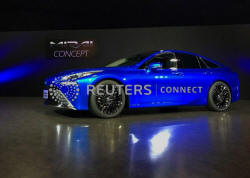|
Japan's biggest automaker has been developing fuel-cell vehicles
for more than two decades, but the technology has been eclipsed
by the rapid rise of rival battery-powered electric vehicles
promoted by the likes of Tesla Inc <TSLA.O>.
Ahead of the Tokyo Motor Show starting on Oct. 24, Toyota
unveiled a prototype of the new hydrogen sedan built on the same
platform as its luxury Lexus brand's LS coupe. The new Mirai
model boasts longer driving range than its predecessor and
completely redesigned fuel cell stack and hydrogen tanks, the
company said.
"We wanted to make a car that people really want to buy, not
just because it's an eco car," Yoshikazu Tanaka, chief engineer
of the new Mirai, said at the unveiling.
"We wanted something that's fun to drive."
Its sporty redesign with longer wheelbase and lower-slung
chassis is a marked departure from the first-generation Mirai,
which looks like a bulked-up Prius hybrid.
The new car also has a 30% improvement in driving range over the
previous iteration's approximately 700 kilometers (435 miles),
according to the company.
Tanaka said the latest Mirai would cost less to make than its
predecessor, because of a shift to mass production. The current
model is mostly assembled by hand.
Costing consumers about 5 million yen ($46,500) after subsidies
in Japan, the original Mirai is one of three fuel cell cars
available to consumers. Hyundai Motor Co <005380.KS> sells the
Nexo, while Honda Motor Co Ltd <7267.T> leases out the Clarity.
Toyota has sold fewer than 10,000 of the Mirai, a fuel cell
sedan it touted as a game changer at its launch five years ago.
By contrast, Tesla sold 25,000 of battery-powered Model S sedans
in its first year and a half.
Toyota declined to disclose a price for the model and said it
would be available from late next year in Japan, North America
and Europe.
(Reporting by Kevin Buckland; Editing by Miyoung Kim and Mark
Potter)
[© 2019 Thomson Reuters. All rights
reserved.] Copyright 2019 Reuters. All rights reserved. This material may not be published,
broadcast, rewritten or redistributed.
Thompson Reuters is solely responsible for this content.

|
|





